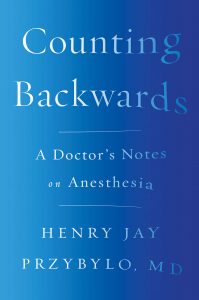
by Henry Jay Przybylo, MD.
W. W. Norton & Company, Inc., 2017.
Hardcover, 256 pages, $26.
Reviewed by Jacob A. Bruggeman
On occasion, one can come upon good books by coincidence. An offhand recommendation from a friend or colleague, a reference made in a movie, or a glance at a striking cover can lead us to a book we would otherwise miss. Such was my encounter with Counting Backwards: A Doctor’s Notes on Anesthesia by Henry Przybylo, an associate professor of anesthesiology at Northwestern University’s School of Medicine specializing in pediatric anesthesiology and pediatric cardiac procedures.
The 227 pages of Counting Backwards are packed with personal anecdotes, medical history, analyses of human pain, and procedural information. Przybylo presents his perspectives in chapters of anecdotes and insights—gleaned from decades of experience as an anesthesiologist—and their effects on his personal life and professional philosophy. Progressing though chapters with titles such as “errors everlasting” or “in wait,” readers will learn of the significant “curbside consultation” between medical professionals in hospital hallways, they will read of figures such as the Roman physician Celsus and Civil War-era doctor A. W. Chase, and they will come to understand, if only slightly more clearly, the trade-offs and stresses encountered in the “dark side of medicine.” Przybylo pulls from a broad range of thinkers and medical history to narrativize his own career: he quotes Donald Rumsfeld and Nietzsche, he draws from Greek mythology and Chinese medicine, and he weaves these diverse sources together in elegant and readable prose.
Przybylo’s new book is the product of research into these diverse sources and, more importantly, of a powerful sense of introspection. At points Counting Backwards can read like a meditation on medicine produced by the momentum of a successful career, and at other times somewhat like a memoir. This introspective quality is captured throughout but is perhaps best illustrated by a passage Przybylo writes about the human heart as the “most inspirational organ to observe, to touch, to feel,” and that his “medical emotion” is most stirred by “watching the heart deep in the chest, lurching with every beat.”
These are presumably peculiar thoughts for the lay reader, whose eyes probably have never witnessed the heart “lurching” in a human chest. Medical professionals, however, have no shortage of opportunities to observe and contemplate the human body. Counting Backwards is a beautiful, moving anthology of an anesthesiologist’s experiences and yet these experiences cannot fully account for the book’s value. Przybylo’s book is important because it offers the public an often-overlooked perspective: that of the medical professional engaged in sensitive interactions with vulnerable persons. More than conveying what Przybylo himself has learned throughout a long career, though, Counting Backwards humanizes the medical professional; it pulls back the physician’s sterile white mask and reveals a human face. As a matter of professional practice Przybylo has refined the art of distracting and entertaining children—and worried parents—prior to procedures.
Despite playing a central role in the lives of millions, the work of medical professionals in general and anesthesiologists in particular is often unknown. Counting Backwards is by no means a compendious account of anesthesiology or Przybylo’s experiences as a medical professional. Rather, it is an enlightening, entertaining, and clear chronicle of the things he has learned through decades of doctoring, teaching, and thinking about the significance of his profession in a world where issues of end-of-life care and chronic illness are only increasing. Public debates often focus on the cost and unequal distribution of medical services and so overlook practitioners and their experiences.
My acquisition of this book was admittedly accidental—a kind of encounter I just mentioned. On my way back to Cincinnati from Phoenix, I had a long layover in Dallas, where I finished the book I had with me. With hours to burn, I stopped in an airport bookstore and purchased Counting Backwards because its cover caught my eye and it looked short enough to finish on the final leg of return flight. I read most of the book on that flight and the rest shortly thereafter, and I am better for reading it.
Jacob Bruggeman is a student at Miami University with majors in history and political science, and a combined BA–MA program in political science. Jacob was recently honored for his research as one of fifteen national recipients of the Gilder Lehrman History Scholar award, and is one of two Joanna Jackson Goldman Scholars at Miami. In 2017, Jacob founded The New Herald, a journal of cultural and political commentary.